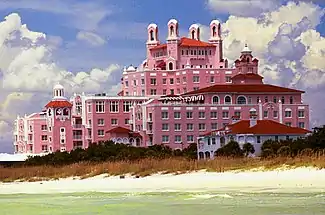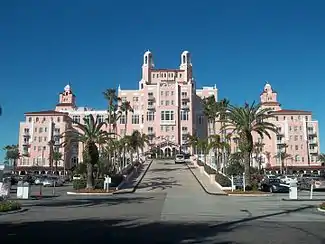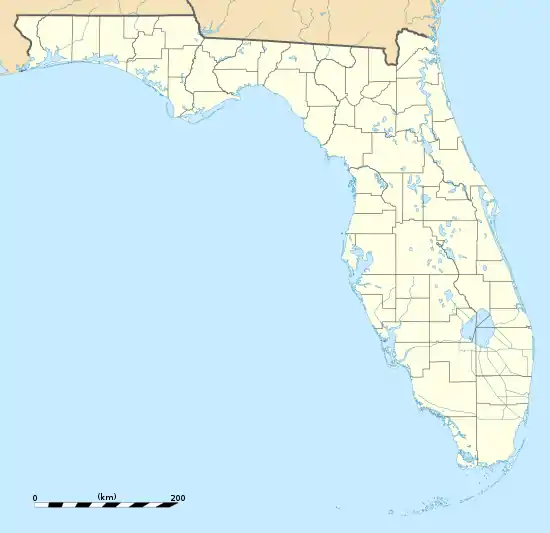The Don CeSar
The Don CeSar is a hotel located in St. Pete Beach, Florida, in the United States. Developed by Thomas Rowe and opened in 1928, it gained renown as the Gulf playground for America's pampered rich at the height of the Jazz Age and it still serves as a popular retreat for the rich and famous of today. The hotel was designed by Henry H. Dupont. The Don CeSar is a member of Historic Hotels of America, the official program of the National Trust for Historic Preservation.[2]
| Don CeSar Hotel | |
|---|---|
 | |

| |
| General information | |
| Location | St. Pete Beach, Pinellas County, Florida |
| Opening | January 16, 1928 |
| Management | Host Hotels & Resorts |
| Technical details | |
| Floor area | 40,000 square feet (3,700 m2) |
| Design and construction | |
| Architect | Henry H. Dupont |
| Developer | Thomas Rowe |
| Other information | |
| Number of rooms | 277 |
| Number of suites | 40 |
| Number of restaurants | 3 |
| Website | |
Don CeSar Hotel | |
 | |
  | |
| Coordinates | 27°42′32″N 82°44′15″W |
| Built | 1925-28 |
| NRHP reference No. | 75000563[1] |
| Added to NRHP | April 3, 1975 |
Construction
In 1924, Thomas Rowe purchased 80 acres (320,000 m2) of land in St. Petersburg, Florida for $100,000 to begin his dream of building a "pink castle". He hired Indianapolis architect Henry Dupont to design the hotel and Carlton Beard as contractor. To ensure the stability of the hotel on the shifting sand and avoid the high cost of sinking so many pilings, Beard devised a floating concrete pad and pyramid footings. To this day there is no sign of evident settling of the hotel. The architecture is a blend of Mediterranean and Moorish styles modeled after different hotels and developments that Rowe and Beard saw in Palm Beach, Coral Gables and Boca Raton. Arched openings, red clay tile roofs, balconies, stucco over hollow tile and tower like upper stories were some of the elements that they borrowed. The original design called for a $450,000 six-story hotel with 110 rooms and baths. It was later expanded to 220 rooms and 220 baths and the costs soared to $1.25 million, 300% over budget. Rowe named it Don Ce-Sar after Don César de Bazan, the hero of William Vincent Wallace's opera Maritana.
Opening
Rowe's "Pink Lady" opened on January 16, 1928, with an extravagant party attended by the elite of Tampa and St. Petersburg. The hotel quickly became a favorite romping ground for the rich and famous of the Jazz Age including F. Scott Fitzgerald, Clarence Darrow, Al Capone, Lou Gehrig, and Franklin D. Roosevelt. The Pink Palace continued to attract the rich and famous throughout the Great Depression, thanks in part to a deal made with New York Yankees owner Jacob Ruppert to house his team during spring training for three years.[3]
However, after the sudden death of Rowe without a will, "The Don" was left to his estranged wife and began to fall into disrepair until the United States entered into World War II and the hotel was bought out by the Army for $450,000. It was converted into a military hospital and reopened in December 1942. In February 1944 the Don Ce-Sar became a United States Army Air Corps convalescent center. In June 1945 the Don Ce-Sar was ordered closed and was vacant by September of that year. It was converted into a Veterans Administration Regional Office by the end of 1945.
Rebirth
In November 1967 the Veterans Administration began moving out of the Don Ce-Sar. By spring 1969, the once grand hotel was vacant. The General Services Administration planned to raze the graffiti-covered hotel, but this was met with fierce opposition from local residents. In March 1972 the Don Ce-Sar was sold to C.L. Pyatt and William Bowman Jr., a Holiday Inn franchise owner. The Don CeSar (now spelled without the hyphen) reopened on November 23, 1973. Multiple renovations from 1985 to 2001 have updated and added onto the hotel, including a 4,000-square-foot (370 m2) spa, a signature restaurant, and a second outdoor swimming pool. After the addition of the full-service beach club and spa, the official name of the hotel was changed to The Don CeSar Beach Resort and Spa.
The Don CeSar was named to the National Register of Historic Places in 1975 and became a founding member of the National Trust Historic Hotels of America in 1989.
In popular culture
- The Don Cesar is featured in a full-color two-page spread in a 1982 issue of National Geographic.
- Don CeSar Hotel in St. Pete Beach, Fla, is said to be haunted by the unchained[4] ghost of its original owner, Thomas Rowe {see "Don CeSar Hotel in St. Petersburg Beach" under 'Florida' in the Wikipedia article "Haunted Locations"}
- Two-hour long ghost tours of the hauntings at the Don CeSar are offered by a local sightseeing company.[5]
- Parts of the 1984 crime film Once Upon a Time in America are filmed at the Don Cesar.
- Comedian Ron White talks about his stay at the Don Cesar in the movie Blue Collar Comedy Tour: One for the Road.
- Tom Petty and The Heartbreakers filmed a music video at the Don Cesar in 1985.
- Robert Altman's film Health was largely filmed in the hotel.
- The Don Cesar has a long list of famous guests and has hosted Franklin D. Roosevelt and every president since Gerald Ford (excluding Ronald Reagan).
- Thunder in Paradise pilot movie was filmed around Don CeSar during April 1993.
- The 1999 film Forever Mine starring Ray Liotta, was filmed at the Don Cesar.
- The Don Cesar was one of the featured hotels in the episode "Big Night Out" of Emeril's Florida, a 2013 series starring Emeril Lagasse.
- The 2016 Brad Furman movie The Infiltrator was filmed in part on the rooftop balcony of the Don CeSar in the spring of 2015.[6][7]
- The Pitbull song "Sexy Beaches" was used in the "Visit Florida" tourism campaign, sponsored by the state of Florida. The music video was filmed at The Don CeSar in St. Petersburg, Florida, and was uploaded to Pitbull's YouTube channel on July 13, 2016.
See also
References
- "National Register Information System". National Register of Historic Places. National Park Service. July 9, 2010.
- "The Don CeSar, a Historic Hotels of America member". Historic Hotels of America. Retrieved January 28, 2014. Cite journal requires
|journal=(help) - "The Don CeSar". www.doncesar.com. Retrieved 2018-02-22.
- Habakkuk 3:1 http://splnewulm.org/resources/daily-devotions/340
- http://www.tampabay.com/things-to-do/destination-detail/st-pete-beach-don-cesar-ghost-tour/6180
- "Bryan Cranston films 'Infiltrator' at the Don CeSar on St. Pete Beach". 2015-04-23. Retrieved 2018-02-22.
- "St Pete-Clearwater Beaches". Annalisa Weller's Blog. 2012-05-30. Retrieved 2018-02-22.
External links
| Wikimedia Commons has media related to Don CeSar. |
- Official website
- Florida's Office of Cultural and Historical Programs
- Historic American Buildings Survey (HABS) No. FL-324, "Don ce Sar Hotel, 3400 Gulf Boulevard, Saint Petersburg, Pinellas County, FL", 2 photos, 2 color transparencies, 2 photo caption pages